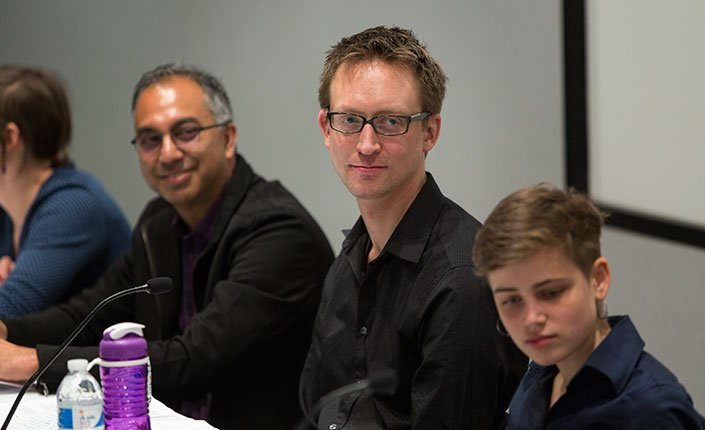Historian Timothy Stewart-Winter '01 on the Price of Gay Marriage

Timothy Stewart-Winter '01 (center)
The New York Times: The Price of Gay Marriage
The Supreme Court’s decision affirming the right to same-sex marriage across the United States is a joyous moment for lesbian, gay, bisexual and transgender Americans. Recognition of our equal dignity, and of our right to the same legal protections straight couples enjoy, is a civil rights milestone. But it could also be the swan song for the movement for gay freedom that began after World War II.
It is unfortunate that the movement’s two great victories of the last decade — the right to serve openly in the military and the right to be married — have come as progress has stalled or reversed in so many other areas of civil rights: equal pay and reproductive choice for women; housing and school segregation; police violence against minorities; and the prospects of a decent wage and a modicum of job and retirement security for all.
It is no accident that the one civil rights law that would likely apply to the greatest numbers of gays — a ban on discrimination in employment and housing on the basis of sexual orientation or gender identity — continues to elude us. An anti-discrimination law creates substantial costs not only for the government, which must enforce it, but also for corporations, which must comply with it; letting gays into military service and into the institution of marriage does not. Indeed, 379 employers, including many of the nation’s largest airlines, banks, health insurers and manufacturers, filed a brief in support of same-sex marriage, arguing that inconsistency in marriage laws created an onerous regulatory and financial burden and hurt their efforts to recruit talent.
After Massachusetts became the first state to legalize same-sex marriage, in 2003, a backlash of ballot initiatives and referendums banning such unions swept much of the country. In response, many lesbians and gay men who were uninterested in marrying put aside their doubts for the cause.
But such unity of purpose comes at a price. Freedom to Marry, the advocacy group that has led the marriage equality movement, was in 2013 the largest recipient of money from foundations that focus on gay causes. Will even a fraction of the energy and money that have been poured into the marriage fight be available to transgender people, homeless teenagers, victims of job discrimination, lesbian and gay refugees and asylum seekers, isolated gay elderly or other vulnerable members of our community? Around the same time New York State legalized same-sex marriage, in 2011, it was slashing funds for services to homeless youth, who are disproportionately gay or transgender.
Read the full op-ed at The New York Times.
Timothy Stewart-Winter '01 is assistant professor of history at Rutgers University, Newark, and the author of the forthcoming book Queer Clout: Chicago and the Rise of Gay Politics. He graduated from Swarthmore with honors in history and a minor in English literature and returned to campus last year to participate in Queer Histories of Swarthmore panel discussion.


